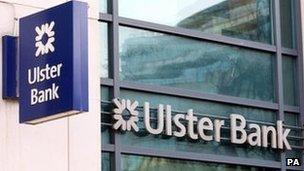RBS to commit to Ulster Bank after Treasury review
- Published

There had been speculation that Ulster Bank would be radically reshaped
RBS, the parent company of Ulster Bank, has reaffirmed its commitment to operating across the island of Ireland.
A Treasury review had been looking at whether RBS should be broken up into separate "good and bad banks".
Instead it will create an internal "bad bank" ring-fencing £38bn of toxic assets such as loans not expected to be repaid. About £9bn is from Ulster Bank.
Ulster Bank will also face a further review aimed at finding a "viable and sustainable business model".
It comes as Ulster Bank also revealed it lost a further £132m in the third quarter of this year as it continues to suffer from the impacts of the property crash.
'Core business'
The bank's operating profit of £72m was wiped out by bad loan charges of £204m, it announced on Friday.
The performance was an improvement on the same period in 2012 when it lost £242m.
Ulster is the largest bank in Northern Ireland and the third biggest in the Republic of Ireland.
There had been speculation that it would be radically reshaped.
However, the bank said a Treasury review had confirmed it was "a core business for RBS and acknowledges the importance of Ulster Bank to the whole island of Ireland".
Despite this, Ulster Bank will be involved in a further internal review looking at its size and shape in the future.
The Treasury's report, external said Ulster Bank "fits well with RBS's strategic footprint and core capabilities, (but) a sustainable operating model needs to be found for it so that it is a viable business in a normalising Irish economy".
It said there was "considerable connectivity" between Ulster Bank and the rest of RBS, and as the largest bank in Northern Ireland, it was "important to the health of the UK economy".
"UK businesses benefit from a bank which is active in both the UK and the Ireland, which remains one of the UK's largest export markets," the report added.
RBS remains 81% owned by the government following a massive bailout at the height of the financial crisis.
The internal bad bank, to be called the Capital Resolution Group, will hold about £38bn of assets.
About £9bn will come from Ulster Bank, mainly relating to commercial property loans.
RBS aims to run these loans off aggressively, shrinking the bad bank by 85% within three years.
Stormont Finance Minister Simon Hamilton said the news that RBS was not being split up was "far better than many people feared".
"We do have the opportunity as a result of the review that will take place to shape Ulster Bank into the bank that we need it to be," he added.
However, his ministerial predecessor and DUP colleague Sammy Wilson said he feared that not breaking up Ulster Bank into a good and bad bank, along the lines of the Republic of Ireland's National Asset Management Agency (Nama), would be "detrimental rather than helpful".
Mr Wilson said that "instead of taking a longer term view as Nama is doing", the internal bad bank "could see a flood of property put onto the NI market at knockdown prices and businesses lumbered with long-term debts for assets sold cheaply in forced sales".
He said it was a "mistake" for Ulster Bank to continue to operate on an all-Ireland basis "without strengthening the decision-making powers in Northern Ireland".
Secretary of State Theresa Villiers said moving assets to the internal bad bank would "draw a line under the past".
"The restructuring announced today should give Ulster Bank a greater ability to lend, providing extra help to Northern Ireland business and the economy," she said.
- Published1 November 2013
- Published31 October 2013
- Published11 September 2013
- Published2 August 2013
- Published4 June 2013